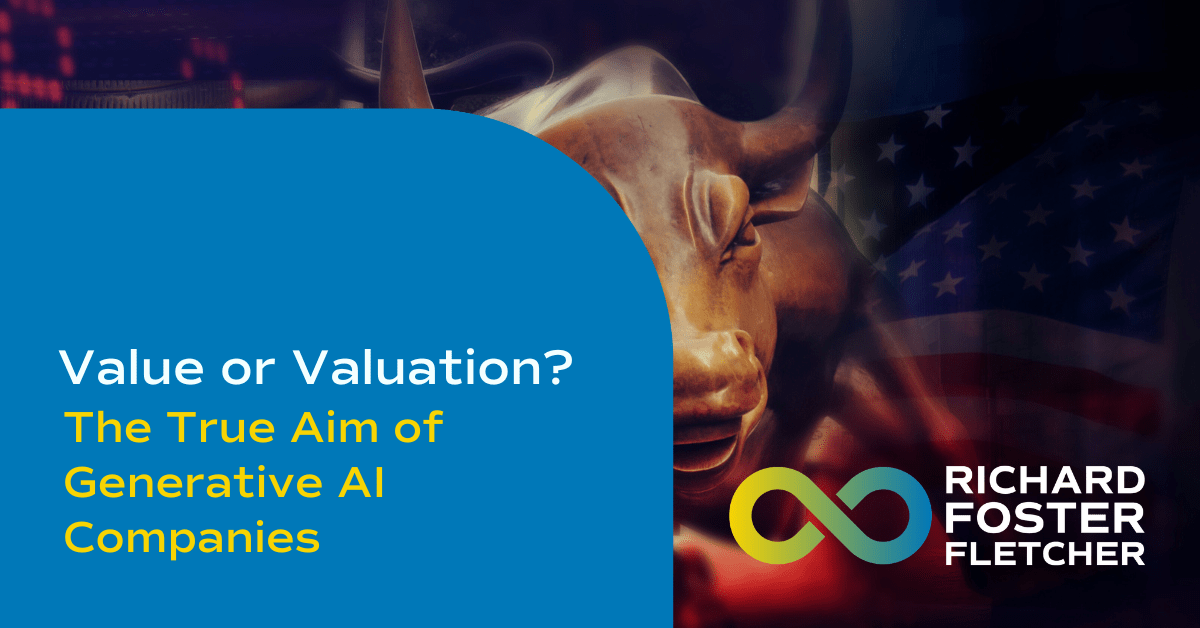
Value or Valuation? The True Aim of Generative AI Companies

Generative AI (GenAI) companies have rapidly ascended to prominence, not just for their technological advancements but for the staggering valuations they command. Sam Altman, CEO of OpenAI, recently stirred significant debate with his bold prediction that AI could soon take over nearly all marketing tasks traditionally performed by humans. Altman envisions AI automating everything from campaign creation to consumer feedback analysis, drastically reducing the need for human involvement. While this claim positions GenAI companies as leaders in the AI revolution, it raises a critical question: Are these companies more focused on creating genuine value through problem-solving technologies, or is the drive to achieve astronomical valuations their true objective?
The Bold Claim: AI’s Role in Marketing
Altman’s prediction that AI could soon manage virtually all tasks in the marketing sector has sparked considerable discussion. The idea that AI could handle nearly all creative processes—producing content, generating campaign strategies, and testing ideas against both real and synthetic feedback—at an unprecedented speed and scale, paints a picture of a future where human input in marketing is drastically reduced. This narrative not only showcases the potential of AI but also strategically positions companies like OpenAI at the forefront of AI innovation, potentially inflating their market valuations.
The Pursuit of Valuation
In the tech industry, bold predictions like Altman’s are often employed as tools to attract investment and drive up company valuations. While these high valuations are enticing for investors, they prompt important questions about the actual focus of these companies. Are they genuinely committed to developing AI that solves real-world problems, or are they more concerned with creating and maintaining high market valuations?
The pattern is clear: ambitious projections can attract significant venture capital, often leading to valuations based more on future potential than on current capabilities. OpenAI, for example, has secured substantial investment by positioning itself as a leader in AI, with investors betting on its future dominance across various sectors, particularly in marketing. The strategy of emphasizing valuation over value can create a bubble effect, where the company’s worth is inflated far beyond the actual utility and impact of its products.
Historical Examples of Over-Inflation from Bold Claims
The tech industry has seen numerous examples of companies whose valuations were inflated by bold claims, only to face downfall when they failed to deliver:
- Theranos: Theranos, led by Elizabeth Holmes, promised a revolutionary blood testing technology that could deliver results with just a single drop of blood. The company’s valuation soared to $9 billion based on these claims, attracting high-profile investors. However, the technology never worked as promised, and the company collapsed when the truth came to light, leading to massive financial losses and a significant public fallout.
- WeWork: WeWork, under the leadership of Adam Neumann, presented itself as a tech company that was transforming the workplace. Its vision and aggressive expansion led to a valuation of nearly $47 billion. However, the company’s actual business model was unsustainable, and when this became apparent, its valuation plummeted, resulting in one of the most dramatic collapses in recent business history.
- Juicero: Juicero, a startup that produced a high-tech juicer, was backed by $120 million in investment based on its perceived potential to revolutionize the health and wellness industry. However, it was later revealed that the juice packs could be squeezed by hand without the need for the expensive machine, calling into question the product’s value and leading to the company’s downfall.
The Consequences of Valuation Over Value
The pursuit of high valuations at the expense of real value can cause the AI industry to falter like a house of cards. If AI companies fail to deliver on their promises, we could witness a wave of disillusionment similar to the dot-com bubble burst of the early 2000s. In such a scenario, the collapse of overvalued AI firms could lead to significant financial losses, a slowdown in AI innovation, and a loss of public confidence in AI technologies.
Moreover, the focus on valuations risks overshadowing the ethical considerations and real-world impact that should be central to AI development. If the primary goal is to boost market value rather than solve pressing problems, the technology’s potential to contribute positively to society could be severely compromised.
To prevent this outcome, it is crucial for AI companies to balance their pursuit of valuation with a commitment to creating genuine value. This means developing AI technologies that solve real-world problems, are ethically sound, and deliver measurable benefits to users. By focusing on value rather than valuation, AI companies can build sustainable businesses that contribute positively to society and withstand the test of time.
Key Questions
- How can AI companies ensure they are creating real value rather than merely inflating their valuations?
- What lessons can be learned from past tech industry collapses to avoid similar outcomes in the AI sector?
- How should investors critically evaluate the true potential of AI companies beyond their market valuation?
















